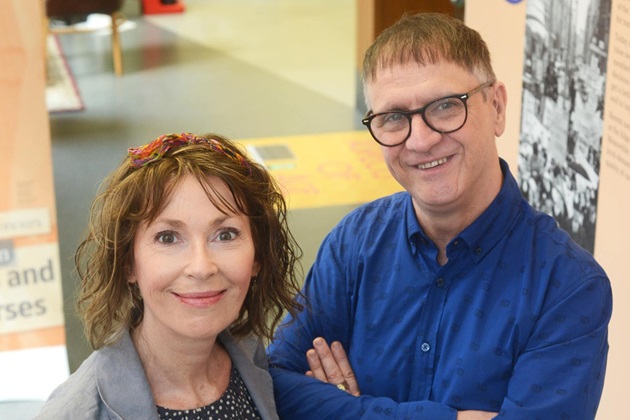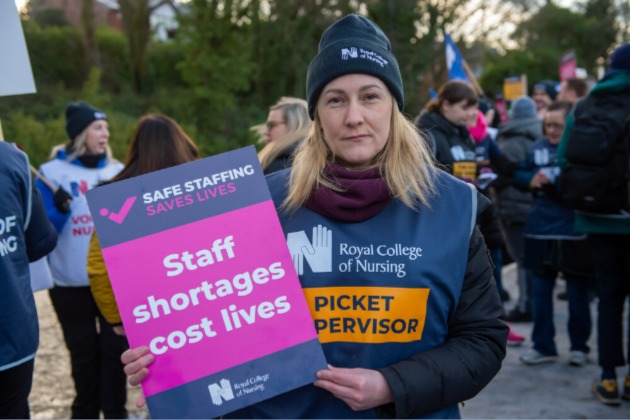Dee and Tony are inspectors for the Care Quality Commission. They’re also registered nurses and RCN members. They explain what their job involves and how they’re on the same side as nursing staff working in the services they scrutinise
Dee McEvoy and her colleague Tony Cliffe have been registered nurses and RCN members since the 1980s. They now work full-time as inspectors for the Care Quality Commission (CQC), the independent regulator of all health and social care services in England.
“It’s a challenging and complex role,” says Tony. “Our work varies but my experience as a nurse keeps me grounded. When I speak to nursing staff on an inspection, I feel we have a lot in common. The CQC is a public service and we face similar challenges to those working in the NHS.”
“Having nursing skills is so important to the job we do,” adds Dee. “Understanding the environment we’re inspecting is key to helping us ensure the care being delivered is safe.”
It’s a challenging and complex role. My experience as a nurse keeps me grounded
Each CQC inspector oversees a portfolio of services, usually within a geographical area.
“We have to maintain an oversight of these services, monitoring and highlighting any risks, dealing with safeguarding issues and making sure there’s a relevant inspection programme in place,” Dee says.
The length of an inspection and number of inspectors involved depends on the size and type of service being inspected.
“We always try to involve an expert by experience,” says Dee. “This is either someone who has used the type of service we’re inspecting or who cares for someone who has.”
I want to demonstrate that I value what nursing staff do. We don’t want people to feel pressured by the experience and we don’t want to disrupt patient care
A lot of work happens behind the scenes before an inspection takes place, including rigorous planning and the analysis of data and information sent over by the service provider.
When the time comes for Dee and Tony to enter a service, they’re mindful of putting the nursing staff they’re visiting at ease.
“A huge part of any inspection is to be able to meet and speak with as many people as possible,” says Dee. “We have to work collaboratively with staff. I want to hear about what they think they’re doing well and what their concerns are.”
Tony, who oversees mental health services in his local area, agrees: “It’s really important that as inspectors we treat staff with dignity and respect and listen to what they have to say.
“I want to demonstrate that I value what nursing staff do. We don’t want people to feel pressured by the experience and we don’t want to disrupt patient care. We try our best to work with people, and to work around them, so they can continue with their job.”
We’re there to ensure people receive safe, effective and responsive care. I know that nursing staff want the same for their patients
Commenting on life as an inspector, Dee, who previously worked in community nursing services, says: “When you knock on the door as a district nurse people are so thrilled to see you but when you knock on the door as an inspector you can tell by people’s faces that they’re anxious.
“I understand that people might feel nervous but we’re not there to catch anyone out. We’re there to ensure people receive safe, effective and responsive care. I know that nursing staff want the same for their patients.”
Dee says that sometimes staff don’t want to speak candidly because they’re worried about the repercussions.
“Unless staff are disclosing a safeguarding issue, we won’t use their names in our reporting or in feedback to the employer,” she says.
“We want to protect people’s anonymity so they have the confidence to speak to us, but it’s also important for staff – particularly registered nurses – to remember their own responsibility under the NMC code to speak up about issues that might affect patient safety.”
We find people want to talk to us. They want to tell us about all the good things and share the great work they do
Tony says that although sometimes it can be challenging, more often than not, staff, and indeed patients, are happy to speak to him.
“We find that people really do want to talk to us because they want to tell us about all the good things," says Tony. “Staff want to share the great work they do. If you’re confident, competent and knowledgeable then you don’t need to be nervous.”
Dee describes the job as satisfying and interesting but all-consuming. “The workload is immense but it’s an incredibly fulfilling job. I feel it really does make a difference,” she says.
Tony encourages anyone thinking about regulation as a career to explore it further. “It’s an opportunity to develop leadership skills and a chance to undertake a more strategic role,” he says.
Although the job involves visiting services to undertake inspections, all CQC inspectors are home-based workers. This offers a degree of flexibility not found in other jobs but Dee says it’s important to understand what that means.
“Depending where you are in the process of an inspection, you might only see your colleagues once a month at a team meeting,” she says. “But personally I love the core of this job and that’s what keeps me going. I love inspecting and ensuring people are safe.”
Words by Zara Davies. Pictures by Gareth Harmer
What makes a service outstanding?
The CQC rates services based on five key questions; are they safe, effective, caring, responsive and well-led? Services are rated on each area and given an overall rating too. There are four possible ratings: outstanding, good, requires improvement and inadequate.
Dee says: “For a service to be outstanding, we’re looking for evidence that it’s exceptional and distinct in some way. In adult social care, the difference between good and outstanding would be those creative and innovative measures that staff put in place to ensure the people being cared for in those services have meaningful and enjoyable lives.
“Care must be visibly person-centred and we’re looking for staff to demonstrate an excellent understanding of people’s cultural and social diversity. Services rated outstanding are flexible and responsive to people’s individual needs and their protected characteristics.
“Part of that is around the training nursing staff have received. We want to see that training has had an impact on practice and that there’s good collaboration with other health and social care services. We’re also looking to see that services are working towards best practice guidelines.
“One of the most important factors we consider is governance. Managers always need a good, clear oversight of their service but when these services are open to change and constantly improving practice, exercising duty of candour and learning from risk, that’s what pushes them from good to outstanding.”
More information
To find out more about the CQC and the role of inspectors, visit the CQC website.








